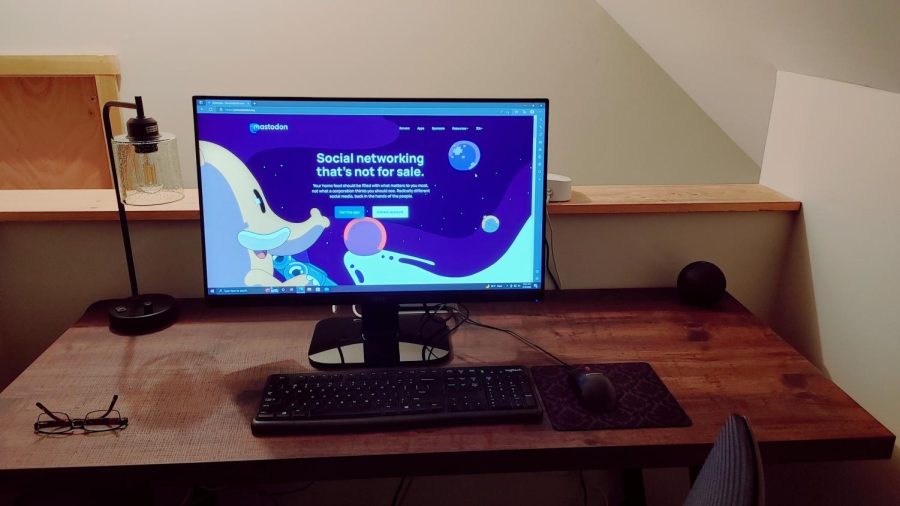A new age of social media?
Unique alternative gains spotlight after Musk’s Twitter acquisition. Decentralized social network.
Imagine, if you will, having more control of your favorite social media platform. What would you do if you had more of a say in how your favorite socials adopt new policies, use your data, and regulate the quality of content and who can post? Dissatisfaction with unpopular decisions from those who run social media is not uncommon, and many feel that the internet has gotten far less nuanced and creative over the years. However, with burgeoning alternatives, a reality of a more user-centric online space is now possible.
After the drama surrounding Elon Musk’s acquisition of Twitter, mainstream sites such as Tumblr have been trying to take the hold that Twitter once had by poking fun at Musk’s decisions and showing itself to be a better space for non-mainstream groups.
While mainstream sites may be throwing their hat into the ring of becoming the new Twitter, lesser-known sites have taken the spotlight as well, the biggest one being the open-source “microblogging” platform Mastodon. One may think that this site is just another Twitter clone, however, with the advent of decentralized social networks, Mastodon brings a unique take on how we share our thoughts with each other.
On the surface, Mastodon functions much like Twitter, with “toots” instead of tweets and the ability to follow your favorite personalities. However, Mastodon is not principally a centralized site; there is no one place that hosts Mastodon, unlike Twitter being run on servers at their headquarters in one location. Anyone can host a Mastodon “instance” and moderate it as they see fit, with anyone able to make an account there.
But that is not the whole story; in many ways, each instance is like its own social network, with its own community, policies, and admins. Each of these instances can connect to each other, so users can talk with each other between them. This is called “federation”, and it means that Mastodon is more of a loose collection of communities than one network under the control of a corporation and its rules.
The implication of this is that any user has far more control over the service than most social networks. If any instance does something a user disagrees with, he can easily join another or create his own if he has the ability to do so, unlike Twitter where anything the company and Musk add simply has to be dealt with, on Mastodon, the users have far more of a say. This model also facilitates better communities with like-minded people and less toxic discussions; each instance can enforce better post quality locally, and then connect to other communities to share posts with the rest of the network for everyone to see.
The last trick up Mastodon’s sleeve is that it is able to federate with other decentralized social media platforms, which means that, someone on the Instagram alternative Pixelfed can have people from Mastodon comment on their post and that you could use one account for both services. All of one’s socials can be accessed with one account so that one can easily manage all their data. What’s more, with the lack of advertisements on Mastodon, there are fewer on the site that can potentially harvest one’s data without their consent; only they and their admin have control of their data. Due to this feature, Mastodon actively partners with other social networks in the “Fediverse,” where they directly work with each other for their services to cooperate better.
Of course, other services also use the same federation technology as Mastodon. These services work in very similar ways to their mainstream counterparts such as Instagram, Spotify, and Facebook, with some unique features unlike centralized networks as well. For example, Hubzilla is a service that allows one to publish a variety of content on a single page that others can follow, and can easily interoperate with other sites, and not just other Fediverse sites. One can use it as the central “hub” of their internet presence much like Facebook and easily interact with people on other platforms, unlike its more traditional counterpart.
There is also WriteFreely, a clean-looking, distraction-free environment to publish writing online, with the ability for individuals or groups to easily connect and build their own publishing space that can be seen in other federated networks.Pixelfed serves as an Instagram alternative where users from other platforms can easily interact and see images published on the service without needing an account off of their platform of choice on the federated network. Lastly, Funkwhale is a Spotify alternative that also easily works with other platforms on the Fediverse.
Ultimately, these decentralized platforms offer a user more choice in how they post and consume content. The many different instances of each service allow one to better interact with like-minded people, which facilitates better quality of discussion on these platforms. This choice of instance for the user also gives them more control over their data, as they can pick an instance that they trust to keep their data safe, instead of putting faith in unknown server admins for that. With the increasing prevalence of few social media sites in the lives of everyone, These alternatives allow one to better make their own choices about how they want social media to affect them. In a moment of increased questioning of these platforms, now is the time to think about and implement more desirable spaces on the internet. The only question left standing is, what kind of online community do we want?
Links:


